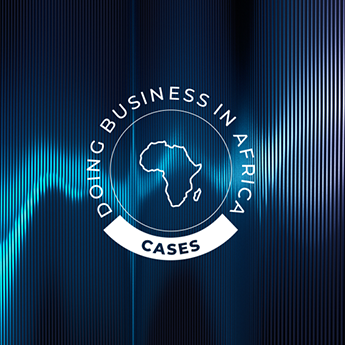With a traditional case collection that now boasts 75 published cases and teaching notes, the Case Writing Centre (CWC) has, in a relatively short time, established itself as a centre of excellence. The centre delved quickly into case research from the outset in 2017 and has played a pivotal role in showcasing the real-life business conundrums of local businesses since. The cases are used at business schools across the globe and a notable 21 of these traditional cases have won international case awards.
Teaching cases are predominantly used in postgraduate business education programmes, like the MBA or EMBA. These real-life business situations assist students by encouraging them to step into the shoes of leaders in a variety of industries, evaluate tricky situations, and practice making tough decisions. Students very quickly have to get to grips with a multitude of issues they confront and the messiness of each situation. There has been a dearth of cases coming from Africa and that is why the GSB CWC has made it its mandate to propel the publication of more local cases.
Doing business in Africa and other emerging markets has unique challenges and African businesses face diverse problems and to varying degrees. But simultaneously, these conditions also offer limitless opportunities for innovation and change. Cases set within this business backdrop are vastly more difficult and intriguing to tackle, and so it becomes essential to add them to the global scope of teaching cases.
But this still did not feel like enough for the CWC. In 2021, with an absolute belief in the case method, matched with the passion to tell more African business stories, the CWC team set out to develop an open-source case series to complement its traditional collection – one that could be brought up to speed with the digital transformation we see all around us. Enter the Doing Business in Africa (DBIA) case series.
DBIA is a series of open-source, multimedia, “deconstructed” cases about African businesses. Alongside the traditional teaching case collection, DBIA showcases relevant African business stories that are of the moment by talking with business leaders about the problems they face today. The cases are presented in a deconstructed format, with the classic elements of a case – the business background, the central dilemma, the contextual data, and the supplementary readings – showcased individually and in various media formats. A deconstructed case includes blogs, podcasts, infographics, link roundups, and insights from faculty and industry experts. Together, these puzzle pieces form a complete DBIA case that can be used by anyone, anywhere, and for any learning objective.
“We want to showcase more of the ground-breaking business stories from Africa. We have invested a great deal of time into thinking about and designing our deconstructed DBIA case series to meet the needs of modern professionals, students, and instructors in Africa. We have also played with the case format to bring it up to speed with the digital space, while hoping to make the material more accessible. This is simply the natural progression of our case work,” says Claire.
The featured DBIA case is released in five instalments on the CWC LinkedIn page and also made available on the CWC website. Readers receive one case piece at a time in the following sequence:
- An introductory blog where they MEET THE COMPANY
- Followed by THE DILEMMA podcast interview with a leader from the company, our protagonist
- Then the EXHIBIT A infographic sets up the industry and country context
- Next, the READING LIST highlights the latest open-source literature on the industry and dilemma subject area
- To conclude the DBIA case, the INSIGHTS blog features reflections from two experts on aspects of the case dilemma
To date, the CWC has released two DBIA cases for readers to dissect and enjoy: Qhala, a digital transformation services provider from Kenya, and Merchants SA, a business process outsourcing company in South Africa. This week, the CWC drops its third case in the series. Just in time for Alumni Weekend, Hello Tractor – an agritech company from Nigeria – is a case that centres on the experiences of CSO & COO Folu Okunade, GSB MBA Class of 2010.
“I encourage GSB alumni to join our CWC LinkedIn page and engage with our DBIA case series. It’s a platform for your voice – what you would do in such a situation? It’s fun, as well as interesting and topical. Besides which, it might solve a similar, current business dilemma of yours or connect you to current literature on important business topics. You’re officially invited to join our case community,” says Claire.
























































































































